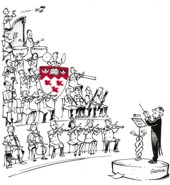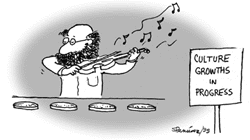|
 |
| Early musical training: How it changes the brain and behaviour |
|
|
|
24th Lecture-Concert on Biology of Music
April 22, 2012

J.Anne Bailey
PhD Candidate
Department of Psychology, Concordia University
Montreal, QC, Canada
(biography)
Early musical training:
How it changes the brain and behaviour
Abstract
Highly skilled individuals such as chess masters, professional athletes, and musicians often begin training in early childhood: Garry Kasparov, Tiger Woods, and Yo-Yo Ma were all practicing and performing by the age of five. Is their amazing skill only the result of many years of practice or is there something unique about starting at a young age, when the brain is rapidly developing? The idea of a “sensitive period” during development implies that the benefits from training or practice are greater the earlier these experiences are accrued. Musicians are an excellent population to investigate the idea of a “sensitive period” and, in order to do so, I have been studying two groups of adult musicians who differ in the age at which they began their training, but not in length of training. I will present these findings and discuss the implications of a “sensitive period” associated with musical training as well as in light of what we are learning about brain plasticity. |
ALP
3/16/2012 12:16:47 AM
Δ:ALP
3/27/2013 7:20:29 PM
|
|
|

|





